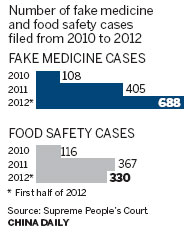Food, medicine safety cases on rise
Updated: 2012-08-01 10:38
By Zhao Yinan (China Daily)
|
|||||||||||
|
 |
"A surge has been observed in the number of cases that have been filed and heard in courts, at all levels, in the past two years," Miao Youshui, deputy director of the Second Criminal Tribunal under the Supreme People's Court, said at a news conference.
Courts across the country have seen 688 cases related to fake medicine in the first six months of this year, up nearly 70 percent on last year's total. The number of cases concerning fake medicine in 2011 rose by 275 percent on the 2010 figure, according to statistics provided by the court.
The number of food safety disputes has risen sharply.
Cases heard by courts stood at 330 at the end of June, nudging close to the entire total for 2011. The number of food safety disputes in 2011, in turn, saw a 216-percent increase on 2010.
Miao said one of the reasons that contributed to the increase was a more sharpened focus, both in legislation and judicial practice, on the issue.
China amended its Criminal Law in 2011 and introduced specific crimes relating to the manufacturing and dealing of substandard food and fake medicine. Prior to this, food and medicine issues were usually treated under general crime, like counterfeit production.
"The top legislature (the National People's Congress) has effectively lowered the requirement on what can constitute such a crime in the amendment, a move widely believed to account for the rising number of disputes," Miao said.
But legislation needs to be clarified further, especially regarding punishment, he added.
The judge said a judicial interpretation on this is likely to be introduced next year.
Wang Dingmian, former vice-chairman of the Guangdong Dairy Industry Association, said penalties for crimes involving food and medicine are "generally light", and those involved need to be punished more severely.
Miao said the top court is working on a judicial interpretation to standardize rulings.
The draft has been discussed and passed by the criminal committee of the court, although he did not indicate when the bylaw will come into effect.
The government's efforts have failed to uproot illegal activities involving food and drug safety even though the country has boosted a crackdown on such activities since an incident with contaminated milk in 2008. At the time, melamine-tainted milk killed six infants and left more than 290,000 others with kidney damage.
On Tuesday, six government officials in Xinchang county, in East China's Zhejiang province, were transferred for criminal investigation for suspicion of dereliction of duty. The officials are being accused of having turned a blind eye to quality testing. Authorities say that more than 900 out of 2,000 capsule producers in the region were found to have never tested their products for heavy metal contamination, while only 700 manufacturers were equipped with testing facilities.
Also on Tuesday, 12 officials in North China's Hebei province were fired, warned or forced to write a review due to their involvement in a case in April when industrial gelatin was used to make capsules.
zhaoyinan@chinadaily.com.cn
Related Stories
Food safety fears gnaw at intl stores 2012-07-16 10:14
Food safety becomes national priority 2012-07-05 10:24
China vows to markedly improve food safety 2012-07-04 13:10
China spots 15,000 illegal food cases 2012-06-20 16:32
Today's Top News
President Xi confident in recovery from quake
H7N9 update: 104 cases, 21 deaths
Telecom workers restore links
Coal mine blast kills 18 in Jilin
Intl scholarship puts China on the map
More bird flu patients discharged
Gold loses sheen, but still a safe bet
US 'turns blind eye to human rights'
Hot Topics
Lunar probe , China growth forecasts, Emission rules get tougher, China seen through 'colored lens', International board,
Editor's Picks

|

|

|

|

|

|





